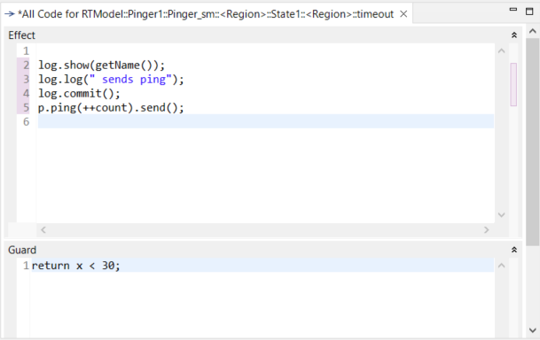

The Model RealTime development team has just finalized sprint 2023.35 and as an outcome two new versions of Model RealTime are now available: Model RealTime 11.3 2023.35 and Model RealTime 12.0 2023.35. The latter is the first version of Model RealTime that works with the new Eclipse 2023.06, but it is currently an experimental release that should only be used for testing.
Let's look at some of the new features that are available in both these releases.

You can now choose to show all code snippets for an element in a single Code editor. This significantly reduces the number of open Code editors, gives a better overview and makes copy/paste of code between different code snippets easier. Each code snippet can be individually collapsed or expanded so that you can maximize the editing area for those code snippets you are most interested in.

The Modeling References command now supports searching for references located in external projects. Together with the related Code Snippet References command it has also been moved in the context menu to now appear in the Navigate submenu. This makes the context menu shorter and easier to use.
It's now possible to compile the TargetRTS with an old C++ compiler that doesn't support C++ 11. This makes it possible for users that, for one reason or another, cannot uplift to a more modern C++ compiler, to still use the latest version of Model RealTime as long as they don't use a feature that requires C++ 11. When building the model an error will be reported (either by the Model compiler or the C++ compiler) if such a feature anyway is used.

Dialogs and views where a list of elements can be filtered by typing text in a filter box have now been harmonized and improved. They all now support "fuzzy" string matching which for example allows you to find an element by abbreviating its name. Boldface is used to show which parts of the name that match the filter text. Also, the Search tab of the Select Element dialog now presents found elements in a table which can be sorted.

You can now express in the model, by means of dependencies, which concrete capsules that at run-time will be incarnated into a capsule part. This is for example useful when the capsule part is typed by an abstract capsule. The commands for navigating to the Composite Structure and State Machine diagram from that capsule part now consider such dependencies. Hence you can avoid to always navigate to the (abstract) type of the capsule part and instead navigate to one of the concrete capsules. Note that the dependencies should be «create» dependencies and it's necessary to use the Model viewpoint for creating them.

Mattias Mohlin
Architect for IBM Model RealTime